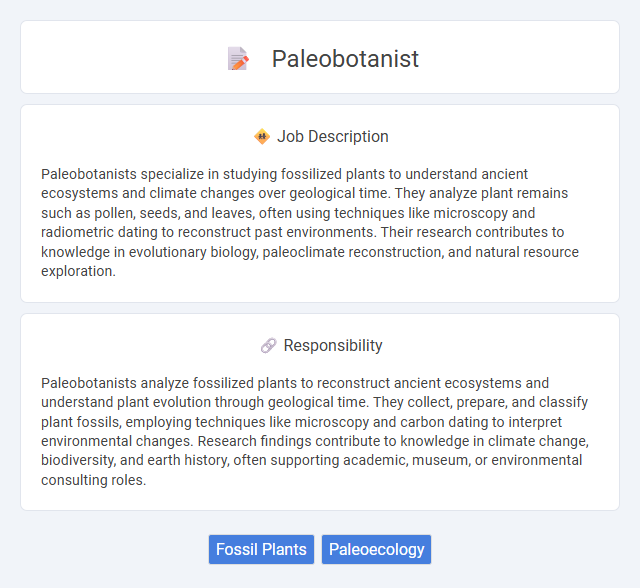
Paleobotanists specialize in studying fossilized plants to understand ancient ecosystems and climate changes over geological time. They analyze plant remains such as pollen, seeds, and leaves, often using techniques like microscopy and radiometric dating to reconstruct past environments. Their research contributes to knowledge in evolutionary biology, paleoclimate reconstruction, and natural resource exploration.
People with strong analytical skills and a passion for ancient plant life are likely to find a career in paleobotany suitable. Those comfortable with fieldwork under varying environmental conditions and meticulous laboratory analysis may thrive in this role. Individuals preferring routine indoor jobs without physical exertion might find this career less fitting.
Qualification
A paleobotanist typically holds a Bachelor's degree in geology, biology, botany, or a related field, often complemented by a Master's or Ph.D. specializing in paleobotany or paleontology. Essential qualifications include strong analytical skills, proficiency in fossil identification, and experience with laboratory techniques such as microscopy and radiometric dating. Knowledge of earth sciences, evolutionary biology, and data interpretation tools is critical for conducting research and contributing to academic or environmental projects.
Responsibility
Paleobotanists analyze fossilized plants to reconstruct ancient ecosystems and understand plant evolution through geological time. They collect, prepare, and classify plant fossils, employing techniques like microscopy and carbon dating to interpret environmental changes. Research findings contribute to knowledge in climate change, biodiversity, and earth history, often supporting academic, museum, or environmental consulting roles.
Benefit
Paleobotanists likely benefit from exploring ancient plant life, which can provide valuable insights into climate change and ecosystem evolution. Their work probably supports advancements in fields like agriculture, conservation, and environmental science by understanding plant adaptation over geological time. This expertise might also enhance paleontological research and contribute to educational outreach, increasing public awareness of Earth's history.
Challenge
Paleobotanists likely face the challenge of interpreting incomplete and fragmented plant fossils while reconstructing ancient ecosystems. The probability of encountering difficulties in precise identification and dating of specimens is high due to natural degradation and geological disturbances. Overcoming these obstacles requires advanced analytical skills and interdisciplinary collaboration.
Career Advancement
Paleobotanists advance their careers by gaining specialized expertise in fossil plant identification, stratigraphy, and paleoecology, often pursuing advanced degrees such as a master's or PhD to enhance research capabilities. Career growth opportunities include leading excavation projects, securing academic or museum positions, and contributing to scientific publications that influence understanding of ancient ecosystems. Networking within professional societies and staying current with technological advances, like CT scanning and isotopic analysis, play crucial roles in securing leadership roles and funding for further research.
Key Terms
Fossil Plants
Paleobotanists specialize in studying fossil plants to understand ancient ecosystems and climate changes over geological time. They analyze plant fossils embedded in sedimentary rocks using techniques such as microscopy and radiometric dating to reconstruct vegetation histories. Insights gained from fossil plant research contribute to fields like evolutionary biology, paleoecology, and earth science by revealing patterns of plant evolution and extinction.
Paleoecology
Paleobotanists specializing in paleoecology study fossilized plants to reconstruct ancient ecosystems and understand climate changes throughout Earth's history. Their research provides crucial insights into vegetation patterns, biodiversity shifts, and environmental interactions over geological time scales. Utilizing tools like isotopic analysis and sediment examination, they contribute to knowledge about past climates and help predict future ecological trends.
 kuljobs.com
kuljobs.com